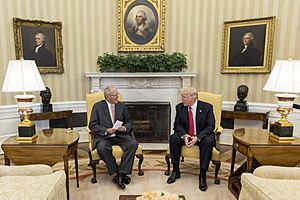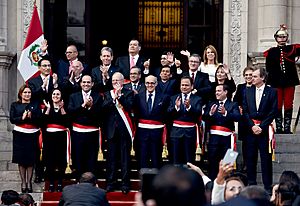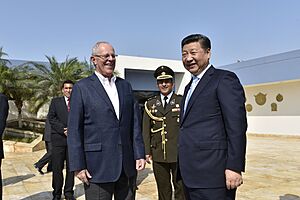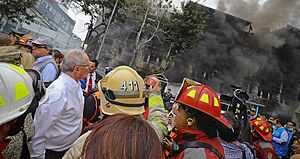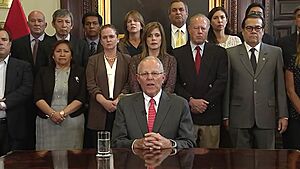Pedro Pablo Kuczynski facts for kids
Quick facts for kids
Pedro Pablo Kuczynski
OSP
|
|
|---|---|
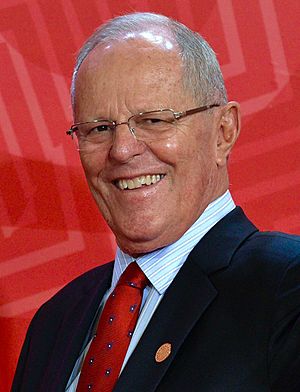
Kuczynski in 2016
|
|
| 59th President of Peru | |
| In office 28 July 2016 – 23 March 2018 |
|
| Prime Minister | |
| Vice President |
|
| Preceded by | Ollanta Humala |
| Succeeded by | Martín Vizcarra |
| Prime Minister of Peru | |
| In office 16 August 2005 – 28 July 2006 |
|
| President | Alejandro Toledo |
| Preceded by | Carlos Ferrero |
| Succeeded by | Jorge del Castillo |
| Minister of Economy and Finance | |
| In office 16 February 2004 – 16 August 2005 |
|
| President | Alejandro Toledo |
| Prime Minister | Carlos Ferrero |
| Preceded by | Jaime Quijandría |
| Succeeded by | Fernando Zavala |
| In office 28 July 2001 – 12 July 2002 |
|
| President | Alejandro Toledo |
| Prime Minister | Roberto Dañino |
| Preceded by | Javier Silva Ruete |
| Succeeded by | Javier Silva Ruete |
| Minister of Energy and Mines | |
| In office 28 July 1980 – 3 August 1982 |
|
| President | Fernando Belaúnde Terry |
| Prime Minister | Manuel Ulloa Elías |
| Preceded by | René Balarezo |
| Succeeded by | Fernando Montero |
| Personal details | |
| Born |
Pedro Pablo Kuczynski Godard
3 October 1938 Lima, Peru |
| Nationality |
|
| Political party | Modern Force (since 2024) |
| Other political affiliations |
|
| Spouses |
Jane Dudley Casey
(m. 1962; div. 1995)Nancy Lange
(m. 1997) |
| Children | 4, including Alex |
| Parents |
|
| Relatives | Jean-Luc Godard (cousin) |
| Alma mater | Exeter College, Oxford (BA) Princeton University (MPA) |
| Signature |  |
Pedro Pablo Kuczynski Godard (born 3 October 1938), often called PPK, is a Peruvian economist and former politician. He served as the 59th President of Peru from 2016 to 2018. Before becoming president, he held important roles like Prime Minister of Peru and Minister of Economy and Finance under President Alejandro Toledo. Kuczynski resigned from the presidency in March 2018. Since April 2019, he has been under investigation for corruption.
Pedro Pablo Kuczynski was born in Lima, Peru. His parents moved there from Germany. He worked in the United States before starting his political career in Peru. He held positions at the World Bank and the International Monetary Fund. He also managed Peru's Central Reserve Bank. In the 1980s, he was the Minister of Energy and Mines. In the 2000s, he served as Minister of Economy and Finance and Prime Minister. Kuczynski ran for president in 2011 and again in 2016. He won the 2016 election and became president on 28 July 2016.
In December 2017, the Congress of Peru started a process to remove Kuczynski from office. This happened after he was accused of receiving payments from a Brazilian company called Odebrecht. He had denied this at first but later said his company received money for advice. Congress did not have enough votes to remove him that time. After more issues and facing another vote to remove him, Kuczynski resigned on 21 March 2018. This was after videos came out showing people trying to buy votes. His First Vice President, Martín Vizcarra, became the new president. In April 2019, Kuczynski was placed under house arrest as investigations continued.
Contents
Early Life and Education
Pedro Pablo Kuczynski was born in Miraflores, Lima, Peru. He is the first son of Madeleine Godard and Maxime Hans Kuczyński. His father was a well-known public health leader in Peru. Kuczynski is also a cousin of the famous French film director Jean-Luc Godard.
His parents left Germany in 1933 to escape the Nazis. His father was a German Jew, and his mother was of Swiss-French background. Kuczynski went to school in Lima and then in England. He later studied at Exeter College, Oxford, and Princeton University in the United States. He earned a master's degree in 1961. He started his career at the World Bank in 1961.
In 1967, Kuczynski returned to Peru to work at the country's central bank. He went back to the United States in 1969. This was because of political changes in Peru. He rejoined the World Bank and later worked in private finance and mining. From 1983 to 1992, Kuczynski was a co-chairman at First Boston, an international investment bank. In 1992, he helped start a company called Latin American Enterprise Fund. This company invested in businesses in Latin America.
Early Political Career
Becoming a Public Servant
In 1980, Fernando Belaúnde Terry became president of Peru. Kuczynski was asked to return to Peru to serve as Minister of Energy and Mines. In this role, he helped create a law that encouraged oil and gas exploration. He left this position in 1982 and went back to working in the private sector in the United States. During his 2016 presidential campaign, he said he left Peru because of threats from a group called the Shining Path.
During the 1980s and 1990s, Kuczynski mostly worked in private investment in the United States. He also made small donations to political campaigns there.
In 2000, Kuczynski joined the presidential campaign of Alejandro Toledo. After Toledo won the election in 2001, Kuczynski became Minister of Economy and Finance. He held this role from July 2001 to July 2002, and again from February 2004 to August 2005. In August 2005, he was appointed Prime Minister. He stayed in this position until Toledo's presidency ended in 2006.
After working with the Toledo government, Kuczynski started Agua Limpia. This is a Peruvian organization that helps provide clean drinking water to communities in Peru.
Working at the Central Bank
Kuczynski returned to Peru in 1966 to advise the government of Fernando Belaúnde Terry. He was made a manager at the Central Reserve Bank of Peru. After a change in government in 1968, Kuczynski and other bank officials were accused of wrongdoing. Because of this, Kuczynski had to leave Peru and go to the United States. After an eight-year legal process, Peru's highest court found Kuczynski and the other officials innocent of all charges.
Minister of Energy and Mines
In 1980, Kuczynski came back to Peru and helped Fernando Belaúnde Terry get elected president again. Belaúnde Terry then appointed Kuczynski as the Minister of Energy and Mines. In this role, he supported a law that encouraged energy and oil exploration. This law gave some benefits to foreign oil companies. It was later changed in 1985.
Minister of Economy and Finance
During Alejandro Toledo's presidential campaign, Kuczynski led the government planning team. He was later appointed as the Minister of Economy and Finance. In this job, he worked with the International Monetary Fund to help Peru's economy.
Prime Minister
Kuczynski resigned as Minister of Economy and Finance in July 2002. He returned to that role in February 2004. Then, in August 2005, he was appointed Prime Minister of Peru. This happened after the previous Prime Minister resigned.
As Prime Minister, Kuczynski made some changes to the government team. He appointed Óscar Maúrtua as the Minister of Foreign Relations and Fernando Zavala as the Minister of Economy and Finance. His time as Prime Minister lasted until President Toledo's term ended in July 2006.
Presidential Elections
2011 Election
On 1 December 2010, Kuczynski announced he would run for President of Peru in the 2011 Peruvian general election.
He ran as the leader of the Alliance for the Great Change. He finished third in the election. The top two candidates, Ollanta Humala and Keiko Fujimori, went to a second round of voting. Ollanta Humala was elected president.
2016 Election
In 2015, Kuczynski announced he would run for president again. This time, he ran with his own political party, called Peruvians for Change.
In Peru's general elections on 10 April 2016, Kuczynski received 21% of the votes. This allowed him to go to a second round of voting against Keiko Fujimori. He won the election by a very small margin, with 50.12% of the votes compared to Fujimori's 49.88%. This was a difference of only about thirty-nine thousand votes. A week before the second round, another candidate, Verónika Mendoza, who finished third, supported Kuczynski.
Fujimori's party had a majority in the Congress, with 73 out of 130 seats. Kuczynski's party had 18 seats.
Presidency (2016–2018)
Kuczynski became president on 28 July 2016. At 77 years old, he was the oldest president to take office in Peru.
His government supported the use of indigenous languages in Peru. In December 2016, the state TV station started broadcasting a daily news program in Quechua. In April 2017, they added one in Aymara. The President's main speech in July 2017 was also translated into Quechua at the same time.
Soon after winning the election, Kuczynski appointed many ministers who supported progressive social policies. His government became known for promoting equality and rights for different groups. This did not please some of his conservative supporters. As a result, the opposition-controlled Congress removed two of his education ministers. They also held a vote of no confidence for his entire group of ministers in 2017.
Foreign Policies
Kuczynski did not agree with the government of Nicolás Maduro in Venezuela. He welcomed many Venezuelans who left their country to live in Peru. Nearly 200,000 Venezuelans settled in Peru. Kuczynski was one of the first leaders in Latin America to ask for more democracy in Venezuela. Peru also withdrew Venezuela's invitation to a big meeting of American leaders because of Maduro's plans for an early election.
Challenges and Resignation
First Attempt to Remove Him
On 15 December 2017, the Congress of Peru started a process to remove Kuczynski from office. The opposition in Congress said he had lost the "moral capacity" to lead. This was after he admitted his company received money from a Brazilian construction company called Odebrecht. Kuczynski had previously denied receiving any payments from Odebrecht. He later said his company, Westfield Capital Ltd, had received money for advice, but he denied any wrongdoing.
Pardon of Alberto Fujimori
On 24 December 2017, three days after surviving the vote to remove him, Kuczynski pardoned former Peruvian president Alberto Fujimori.
Second Attempt to Remove Him and Resignation
After more issues came up, a second vote to remove Kuczynski was planned for 22 March 2018. Two days before the vote, Kuczynski said he would not resign and would face the vote. The next day, on 21 March 2018, a video was released. It showed people close to Kuczynski, including his lawyer and Kenji Fujimori, trying to get an official to vote against removing him.
After this video was released, Kuczynski went before Congress. He officially submitted his resignation as president. Kuczynski's first vice president, Martín Vizcarra, then became President of Peru on 23 March 2018.
Resignation Statement
Kuczynski announced his resignation from the presidency on 21 March 2018.
I believe what is best for the country is for me to resign from the Presidency. I do not want to be an obstacle to the nation's search for unity and harmony, which it greatly needs and which was denied to me. I do not want my homeland or my family to continue suffering from the uncertainty of these recent times. (...) There will be a smooth transition as required by the constitution.
This decision came after videos and audio recordings, known as Kenjivideos, were made public. These showed attempts to offer benefits to members of Congress to stop the second process to remove Kuczynski. Congress accepted his resignation on 23 March 2018. First Vice President Martín Vizcarra immediately took the oath of office.
Other Peruvian presidents who have resigned include Guillermo Billinghurst, Andrés Avelino Cáceres, and Alberto Fujimori. Peru's Constitution says the presidency can become vacant if the president:
- Dies.
- Is permanently unable to do the job, as decided by Congress.
- Resigns and Congress accepts it.
- Leaves the country without Congress's permission or does not return on time.
- Is removed after being punished for certain actions.
Congressional Vote
The leaders in Congress agreed to accept Kuczynski's resignation.
On 23 March, Congress approved the acceptance of his resignation. They also declared the presidency vacant. The vote was 105 in favor, 12 against, and 4 abstentions.
| Party groups | In favor | Against | Abstained |
|---|---|---|---|
| Popular Force | 56 | 0 | 0 |
| Peruvians for Change | 0 | 12 | 0 |
| New Peru | 10 | 0 | 0 |
| Broad Front | 10 | 0 | 0 |
| Alliance for Progress | 7 | 0 | 0 |
| Popular Action | 5 | 0 | 0 |
| Aprista Parliamentary Cell | 5 | 0 | 0 |
| Independent | 12 | 0 | 4 |
| TOTAL | 105 | 12 | 4 |
After the Presidency (2018–Present)
Investigations
On 10 April 2019, Kuczynski was arrested along with his secretary and former driver. This was part of an investigation into money laundering related to the Odebrecht case. Prosecutors were also allowed to search homes connected to him for documents.
On 19 April 2019, a judge ordered Kuczynski to be held in preventive detention for three years. Kuczynski received this news while in a clinic for a heart issue. For his secretary and driver, the judge ordered a less strict form of detention.
On 2 May 2019, Kuczynski left the clinic and was transferred to his home, where he remains under house arrest.
Pandora Papers
In October 2021, Kuczynski's name appeared in the Pandora Papers leak. These documents suggested that in July 2004, when he was Minister of the Economy, he created a company called Dorado Asset Management LTD in the British Virgin Islands. Kuczynski's lawyer stated that Dorado was created only to protect his assets and was used for two properties bought with legal money.
Family and Personal Life
Kuczynski's father, Maxime Hans Kuczyński, was born in Berlin, Germany. He was a bacteriologist and a well-known expert on tropical diseases. He left Germany in 1933 when Adolf Hitler came to power. In 1936, he was invited to Peru to help set up public health services.
Kuczynski has been married twice. His first wife was Jane Dudley Casey. They had three children: Carolina Madeleine Kuczynski, the journalist Alex Kuczynski, and John-Michael Kuczynski. They divorced in 1995.
Kuczynski's second wife is Nancy Lange, an American. They married in 1996 and have one daughter, Suzanne Kuczynski Lange, who studied biology.
Kuczynski's younger brother, Miguel Jorge Kuczynski Godard, is a fellow at Pembroke College, Cambridge. Kuczynski's brother-in-law Harold Varmus won a Nobel Prize for Medicine in 1989 for cancer research.
Kuczynski is a first cousin of the French film director Jean-Luc Godard.
He was a U.S. citizen until November 2015. He gave up his U.S. citizenship so he could run for president of Peru.
Kuczynski speaks several languages. Besides his native Spanish, he speaks English and French very well, and he also knows German.
Electoral History
| Election | Office | List | Votes | Result | Ref. | |||
|---|---|---|---|---|---|---|---|---|
| Total | % | P. | ||||||
| 2011 | President of Peru | Alliance for the Great Change | 2,711,450 | 18.52% | 3rd | Not elected | ||
| 2016 | President of Peru | Peruvians for Change | 3,228,661 | 21.04% | 2nd | → Round 2 | ||
| 2016 | 8,596,937 | 50.12% | 1st | Elected | ||||
Ancestry
| Ancestors of Pedro Pablo Kuczynski | ||||||||||||||||||||||||||||||||||||||||||||||||||||||||||||||||||||||||||||||||||||||||||||||||||||||||||||||||||||||||||||||||||||||||||||||||||||||||||||||||||||||||||||||||||||||||||||||||||||||||||||||||||||||||||||||||||||||||||||||||||||||||||||||||||||||||||||||||||||||||||||||||||||||||||||||||||||||||||||||||||||||||||||||||||||||||||||||||||||||||||||||||||||||||||||||||||||||||||||||||||||||||||||||||||||||||||||||||||||||||||||||||||||||||||||||||||||||||||||||||||||||||||||||||||||||||||||||||||||||||||||||||||||||||||||||||||||||||||||||||||||||||||||||||
|---|---|---|---|---|---|---|---|---|---|---|---|---|---|---|---|---|---|---|---|---|---|---|---|---|---|---|---|---|---|---|---|---|---|---|---|---|---|---|---|---|---|---|---|---|---|---|---|---|---|---|---|---|---|---|---|---|---|---|---|---|---|---|---|---|---|---|---|---|---|---|---|---|---|---|---|---|---|---|---|---|---|---|---|---|---|---|---|---|---|---|---|---|---|---|---|---|---|---|---|---|---|---|---|---|---|---|---|---|---|---|---|---|---|---|---|---|---|---|---|---|---|---|---|---|---|---|---|---|---|---|---|---|---|---|---|---|---|---|---|---|---|---|---|---|---|---|---|---|---|---|---|---|---|---|---|---|---|---|---|---|---|---|---|---|---|---|---|---|---|---|---|---|---|---|---|---|---|---|---|---|---|---|---|---|---|---|---|---|---|---|---|---|---|---|---|---|---|---|---|---|---|---|---|---|---|---|---|---|---|---|---|---|---|---|---|---|---|---|---|---|---|---|---|---|---|---|---|---|---|---|---|---|---|---|---|---|---|---|---|---|---|---|---|---|---|---|---|---|---|---|---|---|---|---|---|---|---|---|---|---|---|---|---|---|---|---|---|---|---|---|---|---|---|---|---|---|---|---|---|---|---|---|---|---|---|---|---|---|---|---|---|---|---|---|---|---|---|---|---|---|---|---|---|---|---|---|---|---|---|---|---|---|---|---|---|---|---|---|---|---|---|---|---|---|---|---|---|---|---|---|---|---|---|---|---|---|---|---|---|---|---|---|---|---|---|---|---|---|---|---|---|---|---|---|---|---|---|---|---|---|---|---|---|---|---|---|---|---|---|---|---|---|---|---|---|---|---|---|---|---|---|---|---|---|---|---|---|---|---|---|---|---|---|---|---|---|---|---|---|---|---|---|---|---|---|---|---|---|---|---|---|---|---|---|---|---|---|---|---|---|---|---|---|---|---|---|---|---|---|---|---|---|---|---|---|---|---|---|---|---|---|---|---|---|---|---|---|---|---|---|---|---|---|---|---|---|---|---|---|---|---|---|---|---|---|---|---|---|---|---|---|---|---|---|---|---|---|---|---|---|---|---|---|---|---|---|---|---|---|---|---|---|---|---|---|---|---|---|---|---|---|---|---|---|---|---|---|---|---|---|---|---|---|---|---|---|---|---|---|---|---|---|---|---|---|---|---|---|---|---|---|---|---|---|---|---|---|---|---|---|---|---|---|---|---|---|---|---|---|---|---|---|---|---|---|---|---|---|---|---|---|---|---|---|---|---|---|---|---|---|---|---|---|---|---|---|
|
||||||||||||||||||||||||||||||||||||||||||||||||||||||||||||||||||||||||||||||||||||||||||||||||||||||||||||||||||||||||||||||||||||||||||||||||||||||||||||||||||||||||||||||||||||||||||||||||||||||||||||||||||||||||||||||||||||||||||||||||||||||||||||||||||||||||||||||||||||||||||||||||||||||||||||||||||||||||||||||||||||||||||||||||||||||||||||||||||||||||||||||||||||||||||||||||||||||||||||||||||||||||||||||||||||||||||||||||||||||||||||||||||||||||||||||||||||||||||||||||||||||||||||||||||||||||||||||||||||||||||||||||||||||||||||||||||||||||||||||||||||||||||||||||
See also
 In Spanish: Pedro Pablo Kuczynski para niños
In Spanish: Pedro Pablo Kuczynski para niños
 | Stephanie Wilson |
 | Charles Bolden |
 | Ronald McNair |
 | Frederick D. Gregory |


